Gongfu Tea Sets
Gongfu tea is a kind of tea-enjoying customs in Chinese folk, populated in Chaoshan Guangzhou, Zhangquan Fujian and other places. As we all know that the Kungfu tea sets is one of the most cultured utensil, including tea pot, gongfu tea cups, tea strainer, gaiwan, tea tray, Chaze, tea carry, ChaZhen, water heater, tea canister, tea plate, fair cup, teaspoon, tea holder and etc, about 15 varieties. And now, we will get to know them at a time as following:
Teapot: a part of kung fu tea sets is dedicated to brew tea, which style and color is very rich. But the most important is still the teapot itself, to remember when selecting, the small is more appropriate, not big, and the more suitable color is light not deep one.
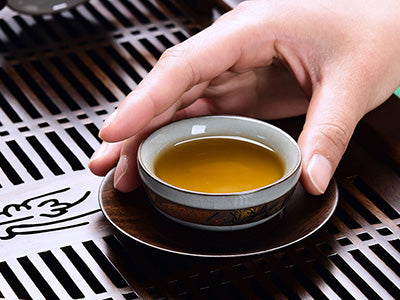
Gongfu Tea Cup: a part of kongfu tea sets is used for tasting tea soup. And there are four words need to be bear in mind: small, light, thin, white. In recent years, fragrance-smelling is becoming an popular activity when enjoying tea.
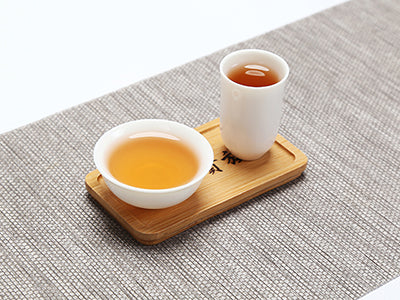
Smelling cup (Aroma Cups): Pay attention to the traditional sado, "first, sniff; second, smell; third, taste", where "smell" is the function of smelling cup. 1. Function - Smelling aroma cup is used to smell fragrant of the tea, together with tea cup. 2. Material - Most smelling cups are made of porcelain, purple clay with white glazedinside. 3. Wise selection - It is better to use porcelain smelling aroma cup, through which you can watch the tea’s color, and purple clay texture cup is easy to make fragrance adsorbed on the cup surface, but not conducive to watch the tea's color. For tea tasting, purple clay cup is better. 4. Usage - 1.Smelling cup generally is used with tea cup, cup holder. 2.When use smelling cup, with cup mouth forward, grip the cup with both hands palm, move it close to the nose, gently rubbing the smelling cup to make it spin, smell while rubbing. 5. Smell the tea fragrance at the second infusion - In brewing tea, the first infusion is used to wash tea leaves and wet them. Empty the tea after the tea leaves spread. The second infusion is to be poured into the smelling cup to smell.
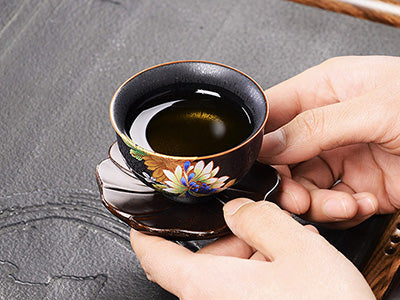
Coaster: Coaster is mainly used with tea cup. The celadon tea cup matches the wooden coaster very well. 1. Function: It is used to place tea cup and smelling cup. It is also known as cup holder or small tea tray. 2. Material: They are mainly made of wood, bamboo, or plastic texture. 3. Wise selection: When you purchase, make the coaster to match tea cup and smelling cup well, these three being in set when being used. Coaster is usually made with tea sets, so they can be purchased in sets. Experienced customers can purchase a coaster with a handle, which is also known as the serve tea clip, which looks healthy and elegant at the friends meeting. 4. Usage: a. Coaster is used to place tea cup and smelling cup. b. Using coasters to serve guests seems more healthier. c. After using, the coaster should be cleaned. If it is made of bamboo or wood, it should be aired to dry.
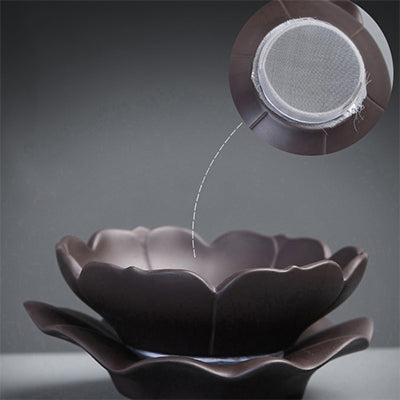
Tea Strainer: is used for preventing the tea leave into the fair cup, to guide the tea soup into pot, preventing tea leaves fall into the fair cup.
Lid set: Lid set is the apparatus to place the lid during the process of brewing tea. 1. Function: Used to place the lid and to keep it clean, to reduce the lid's friction, and also to prevent water droplets from cover to the table. 2. Material: The materials are purple clay, porcelain, bamboo or wood. They are many styles for people to choose. 3. Wise selection: a. Material selection: You had better buy wood lid set, in order to avoid collision, causing the lid broken. b. Style choices: There are many styles, and there are beautiful quality porcelain or small purple holder platform, as well as small cap, drum-shaped pier, etc. You can choose according to personal preference. Lid set is the essential tea sets for seniors, and for those who drink tea occasionally, a clean saucer can be chosen. 4. Usage: a. To place the lid. b. Lid set can avoid direct touch between the lid and the tea table and make the process dean, also reduce friction on the lid. c. Use the lid set for the tea to add a trace of elegance, but it should be washed immediately after use, so as not to have tea stains on appearance. d. There are a lot of shapes of lid set, and it should be cleaned after use to avoid leaving tea stains.
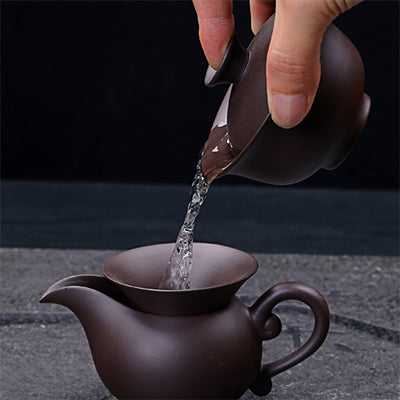
Gaiwan: or tea bowl, dividing into three parts: cover lid, tea bowel, and saucer. Putting 5-8 grams into the gaiwan and then adding some amount of water, then, pour the tea soup into the fair cup. You could brew it with 7-10 times .
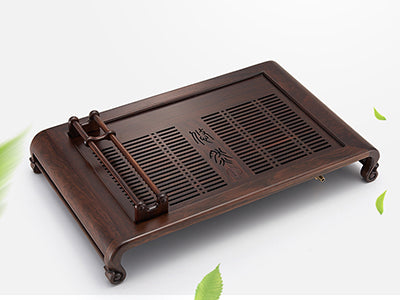
Tea Tray: using for placing tea set or many other tea accessories. And the wasted water or tea soup can pour to it directly. In fact, it is also be regarded as an tray for placing tea set. As for the material, it includes wooden, bamboo, plastic, stainless steel, glass, porcelain, stone etc.
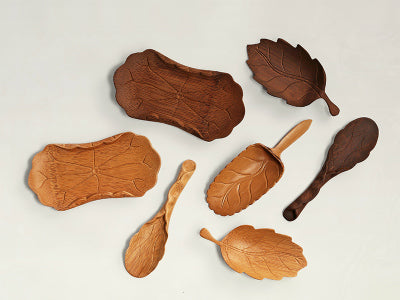
Cha ze: as a kind of tea appliance using for delivering tea into the teapot, usually, it is made of bamboo.
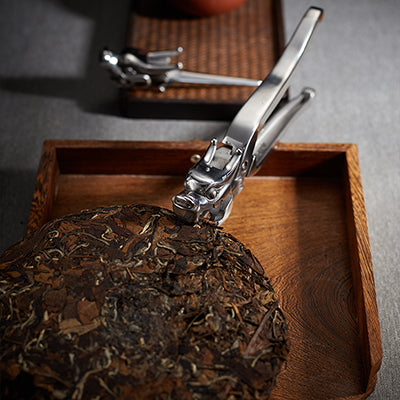
Tea Tong: which function is similar to the teaspoon, is very useful to expel exhausted tea. Of course, there are some people use it to carry cups to wash, anti-burn and keep sanitation.
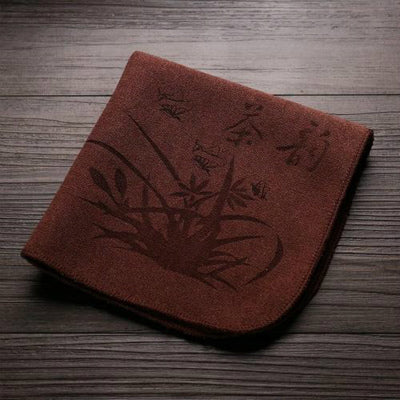
Tea Towel: its main purpose is to clean teapot. Before drinking water, it could be used to wipe up some wasted water in the bottom of cup. And also could be used for wiping the water in table. Also known as tea cloth, tea towel is for cleaning during the process of brewing tea. 1. Function: Used to wipe tea water stains on the outer wall during the process of brewing tea. 2. Material: There are cotton, linen, arabesquitic and plain materials. 3. Wise selection: When you purchase, you can ask the clerk for samples to try, and then choose absorbent cotton or linen tea towels. There are plain towels and arabesquitic towels. You can choose the towel according to personal preferences, tea table and tea sets's color. 4. Usage: a. Tea towel can only wipe the outside of tea tool, not the inside. b. In the process of brewing tea, put your hands gently on the tea towel, which is one of the basic norms of etiquette. c. A demonstration for the use of tea towel: one hand holds a tea set. As to the other hand, the thumb upwards, another four fingers hold the tea towel. The tea towel is used to wipe water stains and tea stains. d. After using, tea towel should be folded up, and the folding method is: first divide the tea towel into three sections, and fold it inward; and then divide it into three sections again, and fold it inward and then into tofu block.
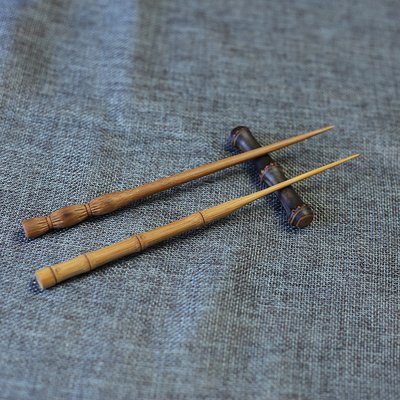
Cha Zhen: its function is to dredge the grind inside to keep clear of tea water.
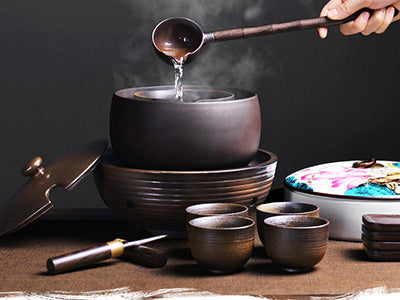
Water Heater: In ancient time, we often use wind furnace to make tea. But currently, the alcohol burner and electric kettle is the most often seen, besides, the gas stove and electronic boiled water machine be used.
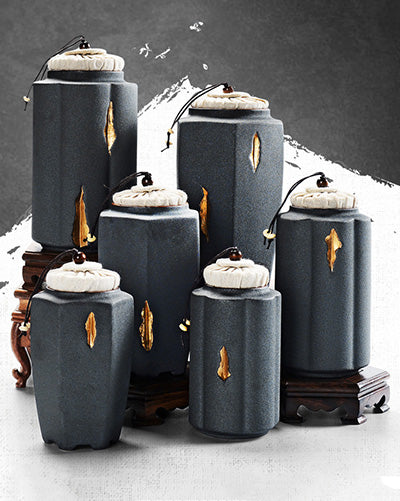
Tea Caddy: using for storing tea leaves, which must be free of taste 100% tight and no any light. As for its material, it could be made of tinplate, stainless steel, tin alloy and ceramic.
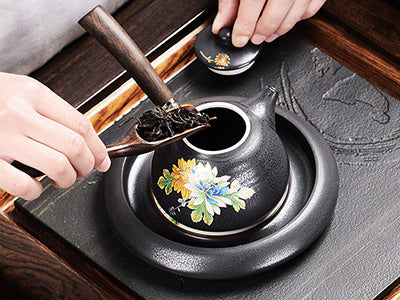
Tea Plate: a kind of tea container used for placing teapot. Putting tea leaves and boiling water, at the same time, pouring the boiling water in to pot to warm up. And of course, it could be used to wash tea cup.
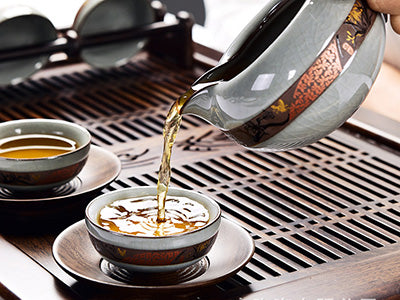
Cha Hai: also called fair cup. After the tea water be brewed for an appropriate time in the teapot, then pour the tea soup to fair cup, dividing tea soup in to different small gongfu tea cups to make sure all of that with the same thick. And also you could choose put a strainer on the fair cup to filter tea leaves.
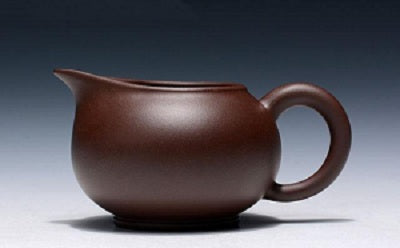
Tea Spoon: also called tea steak. It gets the name just because its shape is similar to spoon. Its main purpose is to take tea leaves from pot. And usually after brewed, the teapot will be stuffed up by tea leaves, besides that, the mouth of pot is very small. So it is not convenient to use hand. At now, the teaspoon will be very useful.
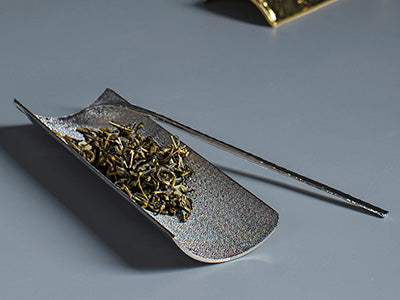
Cha He: its has the similar function as Chaze, which are all used for setting tea. But the tea holder has more visual effects. As we have learned that its main purpose is to deliver tea leaves from container into tea pot. Usually, it is made of bamboo both practical and artistic. Killing two birds with one stone.
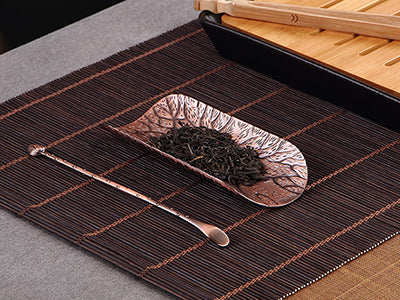
What is Gongfu Tea Ceremony? Learn Kungfu Tea Ceremony Here
If you have not heard of Chinese traditional gongfu cha ceremony before, below are few steps to show you about kung fu tea ceremony.
Gongfu Tea-making method
There are certain tea-making procedures to follow and good match between tea and water. Good tea-making skills can add to the flavor of good tea.
1. Proportion of tea and water
The tea consumption is based mainly on tea category, size of tea sets and drinker's daily habits.
Usually for a 200 ml cup, 3-4 grams of tea leaves is ok. In the first infusion, put the boiling water of 1/3 cup. After that, pour boiling water to the 7/10 or 8/10 cup. Full liquid may arouse unhappiness and discomfort of guests.
Proportion of tea and water relates to tea category. Concerning the very fluffy tea, such as Pekoe Oolong, Biluochun a 7/10 or 8/10 cup of water is suitable. For the little tight tea, a 1/4 pot of water is satisfying, such as the bunched Oolong tea, White Pekoe Silver Needle in the form of bar, thin and fluffy green tea and so on. A 1/5 pot of water is best as to the extremely dense tea, like the sword- shaped Longjing, the needle-like Kungfu black tea, Yulu tea, the spherical gunpowder tea, the angular broken tea, and the scenting scented tea. The tea dosage varies. For regular tea drinkers or manual workers, it is generally to increase the amount of tea leaves and to make a cup of strong tea. For mental workers, or people not addicted to tea, less tea leaves and a cup of fragrant tea are best.
2. Mastery of infusion time
Infusion time relates to rough or tender tea leaves, amount of tea leaves, and water temperature, and also the drinker's taste.
To make a variety of tea extracts in proper proportion in liquid with good color and taste, the first infusion is standardized to be 5 minutes for 3 grams tea leaves (6 minutes for Tie Kwan- yin and heavily-fermented tea).
Relatively tight tea, roundness tea, stretches a lot after infusion. To make sure a wonderful taste, the second and third infusion should be shortened.
Old tea or crude tea need longer infusion time; tender tea leaves easily extracts; re-withered, lightly-fermented white tea such as White Pekoe Silver Needle, White Peony, leaches slowly, and infusion time needs extended.
3. Mastery of times in brewing
After each renewal of water, the leaching active ingredients decrease from tea leaves. The soluble substances can extract 50% to 55% from tea after the first infusion and 30% after the second infusion.
The tea color fades through infusions and nutrients disappear, while harmful elements leach at the end. Thus it's inappropriate to brew tea for many times.
Three infusions are normally recommended for green tea, black tea, and scented tea. Oolong tea can be brewed 4 to 6 times continuously to take full advantage of the active ingredients. Only one infusion is good for broken tea, White Pekoe Silver Needle, and Junshan Silver Needle.
In addition, bagged tea is usually the tea powder of black tea, green tea, scented tea or Pu'er tea, which is easy to extract and only one infusion is enough.
Gongfu Tea-making etiquette
1. Physical Requirements
Walking: walk with two hands crossed in the lower abdomen.
Standing: stand in the best performing posture, notice the facial expressions, and cast the beautiful, sincere eyes to the audience.
Sitting: sit cross-legged.
Kneeling: with knees touching the ground, sit the hip on your legs.
Salute: mainly a bow. Bow deeply and slowly to show deep and sincere respect.
2. Specifications on brewing tea
When making tea, sit quietly with straight spine, and maintain a beautiful, elegant posture. Don't lift up your arms and shoulders high when holding the teapot, or pouring tea or water. Don't tilt your body.
Try not to speak to avoid affecting the aroma and air of tea.
Don't put the spout towards to the guests but to yourself to show respect for the guests.
When pouring tea, do not act too much like the palms facing up, and it is a sense of indecency.
Gongfu Tea-serving etiquette
1. Way of tea-serving
Tea-serving, in general, is to hold the cup body with the thumb and index finger of the right hand, wipe the bottom of the cup on the tea towel, use the left thumb and middle finger to hold both sides of the middle of the cup, put the holder on the tea towel, and then present the tea cup with both hands to customers. Offer the tea with the left hand, and make the please position with the right hand, saying "Please drink tea". The guests indicate with the right hand and say "Thank you".
If there are two or more guests, the tea must be offered in uniform color, and put in the tea tray. Hold the bottom with left hand and the edge with another hand. Serve the tea with the right hand on the guests?right side.
2. Sequence of tea serving
Guests first, and then the host.
The guest of honor first, and then the second main guest.
Women first, and then men.
The elder first, and then the younger.
3. Three principles of tea-serving
Distance: don't place the tea tray too close or too far to the guest. It's too close when guests hold a cup with the bending angle of the arm less than 90 degrees, whereas it's too far if they straight arm to get the cup.
Height: don't make the tea tray side too high or too low. If too high, it's hard for guests to pick up the cup, and if too low, your body will bend badly. The proper height is to allow guests to see the tea at a 45 degree angle of depression.
Stability: be sure to stable the tea tray. When guests hold the cup steadily, move slowly the tea tray, so as not to upset the cup.
Gong Fu Tea-tasting etiquette
1. Tea-tasting with a glasss
When having a green tea or fruit tea, take a deep and straight transparent glass. First, put tea leaves into the glass, pour the boiling water of 80℃ and stop when the water is 1.5 cm nearby the mouth of the cup, and stir gently with a spoon or a stirring rod. Put the glass on the table, with one hand touching the cup body and the other hand's thumb and middle finger (or index finger) handling spoon, slowly stirring in a clockwise direction. After a few times, the tea is changed into the transparent color like crystal with fragrance overflowing.
2. Tea-serving with a gaiwan
The standard posture of tasting gaiwan tea is to hold the gaiwan in one hand, and the cover in another hand, and to put the gaiwan in front of chest, with hands slowly up. Hold the cover with the thumb and middle finger and slightly slide the cover to make the close side of the lid down gently across the tea water and to set aside the floating herbs and tea leaves.If the liquid is very hot, the taster can blow gently with his mouth to help cooling. But don't make a noise.
Tasting tea in a gaiwan, one smells the tea fragrance first, and then enjoys the color, and drinks good tea. It is exactly the beauty of brewing tea with gaiwan.3. Tea-serving with a porcelain cup
Porcelain cup is appropriate for black tea. Put tea leaves into the cup, and only infuse seven tenths of water. Otherwise, it will not meet the tea etiquette. Moreover, too much water may cause burning to the guests or yourself.
The standard of tasting gongfu tea
Observe, smell, taste, and savor
Observe the dry tea, liquid and brewed tea leaves
Firstly, observe the dry tea. Different teas look differently. Tea is divided into bud tea, leaf tea, roundness tea, and stick tea. Each tea differs in color, character, uniformity, tight, and details. Secondly, observe the liquid. Judge the quality and category of tea according to the liquid's freshness and brightness and transparency.
Thirdly, observe brewed tea leaves. That includes thickness, uniformity, and completion of tea leaves. Also remember to observe whether petals have scorch batches, red veins, and red stalks.
Smell in three different phases
Smell when it's dry. It is to smell before brewing and to judge whether the tea is old, rotten, or other bad smells.
Smell in the process of brewing. Smell the rising hot-gas and the special fragrant smell released from the liquid. Smells vary: sweet smell, fire smell, clear smell, flower smell, chestnut smell, etc. These smells are mellow, quiet elegant, refreshing, or natural.
Smell after brewing. Smell the fragrance left on the tea cover and cup bottom. When drinking, other fragrances covered by high temperature will release slowly, smell again, aftertaste the soup.
Three taste aspects
First aspect. To taste the duration of heating, and tell whether it's heated too long, sufficiently, or not enough, or it just has the smell of the sunshine.
Second aspect. To taste the flavor, let the tea water flows in the mouth, and experience sufficiently feelings that the tea brings to different organs so that you can tell the different characters.
Third aspect. After having experienced the taste of tea, aftertaste the lingering charm left in the mouth.
Three aftertaste aspects
Firstly, use the root of tongue to aftertaste the sweetness of the liquid.
Secondly, use the teeth to cheek the aftertaste of the liquid's fragrance.
Thirdly, experience continuous freshness in the throat.
Above are all the details about gongfu tea sets and gong fu tea ceremony, it looks like a bit complex. No worries, below is a simple video to show you how to brew gongfu cha by kung fu tea sets in a simple gongfu tea ceremony way. Take it easy and enjoy this video
